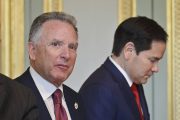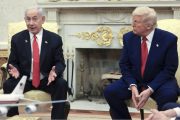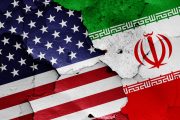
Responding to a New York Times/CBS News poll conducted from April 24-28, only 24 percent of those polled said that the United States has a responsibility to do something about the fighting in Syria between government forces and anti-government groups. An overwhelming majority — 62 percent — said that the United States has no such responsibility. (Poll results.)
Replying to another question about whether North Korea poses a threat to the United States that requires immediate military action, only 15 percent said that military action is required now, 56 percent said that any threat from North Korea can be contained for now, and 21 percent said that North Korea presents no threat to the United States at this time.
The poll also indicated that the American public has tired of following events in Syria, with only 10 percent responding that they are following news about the conflict in Syria closely, down from 12 percent in March and 18 percent last December.
The Times quoted a respondent, Louis Brown from Springfield Township, Ohio, who described Syria and North Korea in a follow-up interview as “political hotbeds.” Brown stated: “We don’t need additional loss of American lives right now.”
Brown said he thought that now was the time to “concentrate on our own backyard,” and he cited the economy as the most important problem facing the country. Brown said that Congress and President Obama should “address the economic situation in the country and stop infighting.”
Another poll respondent quoted by the Times, Pat Bates of Parkville, Missouri, said she would “hate to see us trot into yet another country and try to fix things when we’re not quite sure what we’re doing.” She continued: “We’ve certainly got enough to keep us busy here without sending our young people over somewhere again.”
Many of those polled also see domestic policy as a high priority, with 24 percent listing the economy as our most important problem, 17 percent naming jobs, six percent choosing the budget deficit, and four percent answering “immigration.” Just one percent said foreign policy was our most important problem, yet two percent said war was most important, indicating that many polled do not see the connection between our foreign policy and going to war. The options of Afghanistan and Iraq as choices did not receive enough votes to register any percentage.
The poll also indicates that most Americans are opposed to overseas involvement only when it comes to sending troops overseas, suggesting that their primary concern is human casualties — an understandable consideration. When asked if they favor using unmanned drone aircraft to carry out bombing attacks against suspected terrorists in foreign countries, 70 percent responded affirmatively, with only 200 opposing such use of drones.
The poll did not ask if using drones to attack suspects in foreign countries might fuel resentment and help the terrorists recruit more supporters (often described as “blowback”), potentially leading to more attacks against Americans.
This latest poll reaffirms widespread dissatisfaction with the interventionist U.S. foreign policy that has led to repeated military involvement around the world for the past 60 years or longer. In an article posted here on January 18, 2012, Alex Newman reported the results of a Washington Times/JZ Analytics poll indicating that “almost half of all Republican primary voters believe the U.S. government must stop spending so much money meddling in world affairs and should focus primarily on domestic priorities instead.”
The poll asked respondents to select one of two statements. The first statement read: “America is the most powerful nation in the world not only because of its strong military but because of the values of personal freedom it represents. America must intervene in the affairs of the world whenever its interests are challenged.”
The second statement read: “America is in a new global era and cannot afford to spread its resources too thin. It must rely on strong alliances with other nations and take care of its domestic priorities first.”
Forty-eight percent chose the first statement, 47 percent chose the second, and the remainder said they weren’t sure. Remember that those polled were identified as Republicans, who in general support overseas military intervention in higher percentages than Democrats.
Such strong anti-interventionist sentiment is not new. An article posted here on December 3, 2009, headlined “More Americans Think U.S. Should ‘Mind its Own Business,’ ” discussed the results of a poll conducted by the Pew Research Center for the People & the Press for the internationalist Council on Foreign Relations (CFR), a New York-based policy group whose members have dominated U.S. foreign policy since World War II.
The report polled CFR members separately — an important distinction given the very heavy presence of CFR members in the U.S. State Department, other executive departments, and many influential private institutions — and compared those results with members of the general U.S. public. It noted that while both the general public and CFR are “apprehensive and uncertain about America’s place in the world,” the general public, “which is in a decidedly inward-looking frame of mind when it comes to global affairs, is less supportive of increasing the number of U.S. troops in Afghanistan than are CFR members.”
The Pew report based on the survey noted:
Fewer than half of the public (46%) and CFR members (41%) say it is very or somewhat likely that Afghanistan will be able to withstand the threat posed by the Taliban. While half of the CFR members (50%) favor increasing the number of troops in Afghanistan, just 32% of the public agrees.
The report continued, using the language long favored to discredit those who oppose interventionism:
In the midst of two wars abroad and a sour economy at home, there has been a sharp rise in isolationist sentiment among the public. For the first time in more than 40 years of polling, a plurality (49%) says the United States should “mind its own business internationally” and let other countries get along the best they can on their own. [Emphasis added.]
As former Texas Congressman and GOP presidential candidate Ron Paul noted in his Texas Straight Talk newsletter of December 18, 2006:
I believe our founding fathers had it right when they argued for peace and commerce between nations, and against entangling political and military alliances. In other words,
Noninterventionism is not isolationism. Nonintervention simply means America does not interfere militarily, financially, or covertly in the internal affairs of other nations. It does not mean we that we isolate ourselves; on the contrary, our founders advocated open trade, travel, communication, and diplomacy with other nations.
The latest poll indicates that more Americans than ever are in agreement with Dr. Paul’s foreign policy views.




